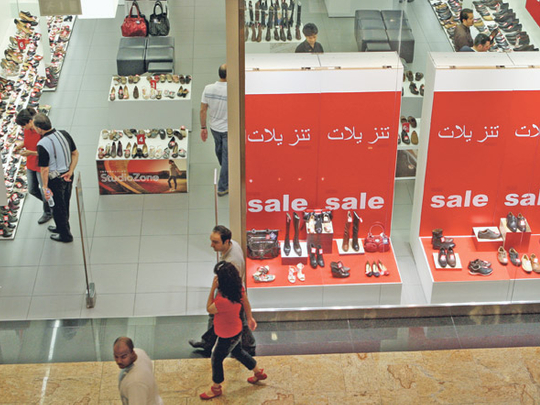
Dubai: Average rentals in the retail sector have declined by about 29 per cent from the fourth quarter of 2008 to the fourth quarter of 2009, according to the Jones Lang Lasalle's Dubai Real Estate Market Overview released recently.
"This is an interesting time as dynamics of the Dubai retail market continue to swing in favour of tenants due to falling rents and increased vacancies in some centres," Blair Hagkull, managing director of Jones Lang Lasalle, told Gulf News.
Rentals also declined by 13 per cent from the third quarter of last year to the fourth quarter on the back of a 15-20 per cent decline in retail sales in 2009.
While this is good news for potential tenants, it is bad news for investors and owners.
According to Simon Thomson, international retail consultant at Retail International, the main challenges faced by the market this year have been the increasing supply of new retail space and low demand during a downturn in the global economy. "However, the Dubai market is currently at equilibrium whereas some other GCC cities may still have a requirement for additional retail floor space," he explained.
Thomson believes that it should take about two to five years for the market to reach post-downturn levels.
New supply
According to Jones Lang Lasalle's report, as of the fourth quarter of 2009, total mall retail supply in Dubai is approximately 24 million square feet.
This is expected increase to over 27 million square feet by the end of this year and to 32 million square feet by the end of 2012. This includes the Mirdif City Centre, comprising 1.9 million square feet, which is due to open this year.
Dubai Brands are expected to dominate the organised retail sector in the coming years, as Dubai's retail market scene changes rapidly, experts say.
According to Mark Morris Jones, director of retail at CBRE real estate company, cities in the Mena region such as Dubai have a high penetration of brands, particularly from Europe and the US.
"Dubai has been the leading retail focus for brands coming to the region for some considerable time and given the current market, the retail operators are in the forefront of benchmarking performance and being more measured with their roll-out strategies," Jones told Gulf News.
Dubai's infrastructure, location and tourism are some of the factors that encourage franchises in setting up shop in the city according to Jones. "Franchises are attracted by operators, the stock of suitable retail real estate, a large population and their spending habits, air links and access to regional populations, and their levels of inter-region and international tourism."
Attracting franchisees
In order to encourage tenants Dubai is focusing on attracting international brands. According to CBRE's most recent retail report, the Mena region is set to evolve from an emerging market to a mature one over the next year.
The survey found that a far higher proportion of retailers who say they are likely to franchise are targeting the "emerging market". The exception is the Mena region. One explanation is that a high proportion of those who look at franchising in the region have already done so.
"Certain areas of the Mena region are such that you cannot come in with 100 per cent ownership as the local laws won't allow it. It is clear from the report that retailers not already present in the Mena region would prefer to enter the market on an owner-operator model as opposed to franchising or a joint venture.
"On that point, given the number of brands operated regionally it can be assumed that for the most part, all parties are happy with the situation," Mark Morris Jones, director of retail at CBRE Middle East explains.











